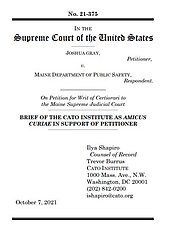Learn more about Cato’s Amicus Briefs Program.
Can a state licensing board deny someone a license for criticizing the police? Joshua Gray is a long-established private investigator who used social media to publicly condemn a police shooting in Maine. He called it an avoidable result of police recklessness, and he voiced his opinion that one of the officers was “possibly drunk” and that the officer had “murdered” one of the women in question. Gray later applied to become a private investigator in Maine. Yet the very agency he criticized online, the Maine Department of Public Safety, retains absolute authority to issue or deny licenses to operate as a private investigator in the state.
Based on the requirements of a nebulous “good moral character” standard, the Department of Public Safety denied Gray his license for expressing what it characterized as falsehoods regarding the shooting. According to the department, Gray’s statements on social media “demonstrated a pattern of reckless disregard for the truth,” and thus he lacked the requisite moral character to perform the duties of a competent private investigator. The Institute for Justice filed suit on Gray’s behalf, arguing that such a denial violates his right to freedom of speech guaranteed under the First and Fourteenth Amendments.
Cato has filed an amicus brief supporting Gray’s petition to the Supreme Court. We argue that heightened judicial scrutiny must apply when good moral character requirements are triggered by speech on public issues. The First Amendment protects not only the right to express oneself, but the free flow of those thoughts in the proverbial marketplace of ideas. If state licensing boards can weaponize good moral character requirements to silence speech critical of government, the First Amendment is indeed nothing more than a parchment guarantee.

This work is licensed under a Creative Commons Attribution-NonCommercial-ShareAlike 4.0 International License.


